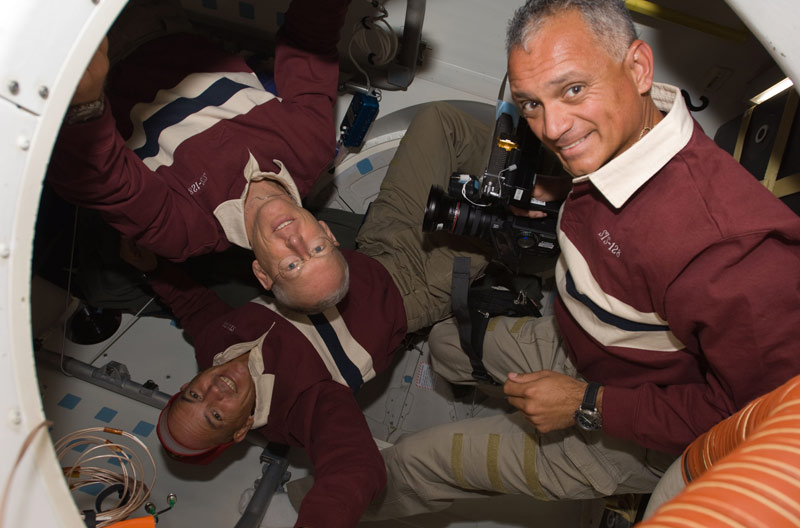Astronauts Complain of Stuffy Heads in Space

Astronautsaboard the space shuttle Discovery have got a case of stuffy heads, but NASAdoesn?t think they?re sick.
Morelikely, the effects reported by theastronauts have more to do with crowd control and the pockets of carbondioxide generated when they gather in groups, space station flight controller HeatherRarick said.
"I don?tthink they have any ill health whatsoever," Rarick told reporters in an earlymorning briefing.
Discoverycommander Rick Sturckow radioed Mission Control early Wednesday to say his crewwas complaining of stuffiness and that it was a new experience when compared tohis three previous spaceflights.
He reportedit because Mission Control should know, but stressed that the discomfort wasrelatively low and would have no impact?"on our ability to function fully andcomplete the mission successfully."
Rarick saidthat the symptoms reported by the crew could be due to poor ventilation incertain spots between Discovery and the International Space Station.
A similarsituation hashappened before. In 1999, higher than expected carbon dioxide levels in thespace station?s Russian-built Zarya module were thought to have contributed toill effects reported by astronauts who complained of headaches and nausea. The symptomseased after the astronauts returned to their shuttle.
Get the Space.com Newsletter
Breaking space news, the latest updates on rocket launches, skywatching events and more!
Rarick saidcarbon dioxide levels on the space station and Discovery should be within thenormal range. But it is possible that pockets of carbon dioxide could developas the astronauts work in close quarters with one another, she added.
There are13 people - a record-tying crowd - currently living on the linked space stationand Discovery - seven astronauts from the shuttle and six others on thestation. Rarick said that Mission Control and the astronauts have been vigilantin their efforts to ensure good ventilation between the spacecraft.
Astronautshave been trulysick in space before, most recently last year when a European astronaut hadto pass on a spacewalk due to a bad bout of space sickness. But Sturckow andhis crew underwent NASA?s regular quarantine procedures before launch to avoid developingan illness in space and are not medically ill, Rarick said.
Theastronauts are also not affected to the point where their orbital work is suffering,she added. Sturckow and his crew are in the middle of a 13-day mission todeliver new sciencegear and supplies to the space station and have been on or ahead of theirmission plan in terms of cargo transfer, mission managers said.
OnWednesday, the astronauts plan to move a pair of sophisticated racks of scienceequipment to study new materials and fluid physics in space aboard the station.They delivered a treadmill named after TVcomedian Stephen Colbert on Tuesday.
?As long asthey feel like they can continue to do their job, we probably won?t spend muchtime working on that problem,? Rarick said.
- New Video - Meet the STS-128 Shuttle Astronauts
- Sleeping in Space is Easy, But There?s No Shower
- Video - Stephen Colbert to NASA: 'No Chubby Astronauts'
SPACE.comis providing complete coverage of Discovery's STS-128 mission to theInternational Space Station with Managing Editor Tariq Malik and Staff WriterClara Moskowitz in New York. Clickhere for shuttle mission updates and a link to NASA TV.
Join our Space Forums to keep talking space on the latest missions, night sky and more! And if you have a news tip, correction or comment, let us know at: community@space.com.

Tariq is the Editor-in-Chief of Space.com and joined the team in 2001, first as an intern and staff writer, and later as an editor. He covers human spaceflight, exploration and space science, as well as skywatching and entertainment. He became Space.com's Managing Editor in 2009 and Editor-in-Chief in 2019. Before joining Space.com, Tariq was a staff reporter for The Los Angeles Times covering education and city beats in La Habra, Fullerton and Huntington Beach. In October 2022, Tariq received the Harry Kolcum Award for excellence in space reporting from the National Space Club Florida Committee. He is also an Eagle Scout (yes, he has the Space Exploration merit badge) and went to Space Camp four times as a kid and a fifth time as an adult. He has journalism degrees from the University of Southern California and New York University. You can find Tariq at Space.com and as the co-host to the This Week In Space podcast with space historian Rod Pyle on the TWiT network. To see his latest project, you can follow Tariq on Twitter @tariqjmalik.









